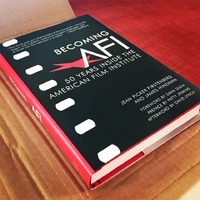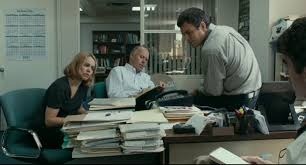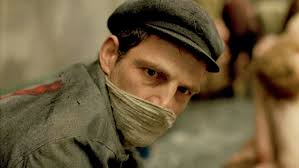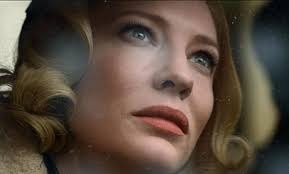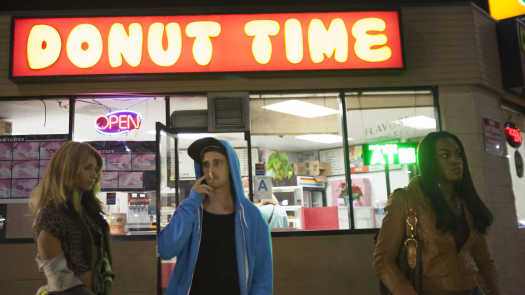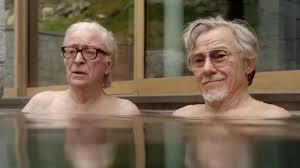Amateur movie-lovers like me are at a distinct disadvantage compared to critics, festival programmers and others who have privileged access to cinema titles. But with the Golden Globes upon us and the Oscar nominations imminent, I won’t wait any longer to provide version 1.0 of my favorite 2014 films, even though I know there are some movies that remain to be seen. I’ll post an update in a month when I’ve gotten through the accumulated Netflix and Amazon queues, Film Independent screeners and screenings, and various late theatrical openings here in L.A.
In the meantime, here are those movies that moved me, two dozen in all, roughly in order of preference. Were I forced to pick a top ten, it would come from the first dozen, with many worthy titles in the second dozen.
If you’re interested in my reviews, follow me on Flixster.
 First Tier
First Tier
A Most Violent Year - Chandor's screenplay is perfect, and because of his remarkable skill with both actors and the physical delivery of cinema, this is for me an almost perfect film, a novelistic thriller of a movie that drops us right in the middle of the circumstances of these characters (and their time and place) and lets the back story fill in through the forward propulsion of the story. We learn something about the characters in virtually every scene and every exchange of dialog. For instance, the looming figure of the Chastain character's father, who never appears in the film, plays a larger and larger role as we learn, bit by bit, the precise nature of this marriage and the business that forms the center of the action we experience. Ditto with the complicated relationship between the players in the fuel oil business, the D.A,, the cops, and the mob. Chandor knows that he is playing in the fields so well plowed by The Godfather and its imitators, and his subtle, controlled and engrossing version of a crime drama, in a sense, trumps Coppola's earlier, groundbreaking work (something I never thought I would say). This is an unmitigated triumph of cinema storytelling.
Birdman - Audacious at every level, Iñárritu's breathtaking examination of the wages of fame and pride just blew me away. Start with the fact that here we have the story of a washed-up actor known for playing a superhero, played by, yes, a somewhat washed-up actor known (in part) for playing a superhero. And then, a ferocious depiction of an all-consuming obsession to be both famous and taken seriously, to the point where all relationships are destroyed. And then, a delirious experiment with a camera that swoops and flies in what would appear to be a single uninterrupted shot, which sounds like a gimmick, and certainly is, but still, it works. And then, well, world-class acting that is so raw and funny it makes you want to cry, scream and cringe at the same time. This is, quite simply, the best "movie" movie in a very long time, and I loved it.
Boyhood -If the production history of this one-of-a-kind film seems at first like a gimmick, any concern fades as the experience of this coming-of-age-in-a-dysfunctional-family tale takes hold and never lets go. We marvel at the performance of a child who, before our very eyes becomes a young man. Yes, we wonder how much of this is "acting" and how much of the story is "scripted". I for one also found myself surprised over and over again at the transitions between years, which were seamless and often undetectable. None of this would matter, of course, if the story weren't touching, and as the response indicates, universal. These feel like real people in my life, people I want to know forever.
Nightcrawler - The set-up draws you in, the idea of an ambulance chaser who captures the horrific violence that we see on the TV screen every night, not the least of which because it is the audience's desire to see this stuff that creates so much value (and money) in the first place. We want to look away, but we cannot. And so we find ourselves sympathizing with a sociopath who has found his calling, a lucrative way to sidle up close and personal to blood and death and a golden opportunity to cross the moral line from observer to perpetrator. The performances vibrate with electrical energy. Gyllenhaal has never been better, hungrier, showier, fiercer.
The Theory of Everything - Redmayne jets into the upper echelons of acting with his depiction of Hawking before, during, and after the deterioration of virtually all bodily functions. Saddled with all of the problems that the biopic form presents, this film nevertheless manages to impart the essence of an amazing human being, and along with it a slight understanding of the science he helped create. Hawking is something of a secular saint, so it's nice to see a few of his imperfections, as well.
Grand Budapest Hotel - This movie brings to perfection all of the elements of Anderson's quirky style -- his meticulous creation of a slightly demented world, his vivid and geometric art direction, heightened and somewhat melodramatic directing style, contained and hilarious set-pieces, singular and eccentric characters, and a very intense focus upon the particular. His ensemble cast delivers scene after scene of delight and reimagined history of the fading of a Europe that may never have been. Anderson creates nostalgia as an end in itself.
Love is Strange - Sachs presents an affecting, modern story of a longtime gay couple whose economic circumstances lead to make-good living situations apart from each other. Complications ensue in a charming, truly beautifully unfolding way, with intense emotions driving great empathy in scene after patient and beautiful scene. Pay close attention to the editing.
Citizenfour - In this stunning exploration of the national security state, we are witness to a real-time unfolding of the Snowden story. With only a crew and her colleague Glenn Greenwald in a Hong Kong hotel room with Snowden, Poitras captures an intimate portrait of the man behind the revolutionary whistleblowing story as it happens -- on the TV screen, in phone calls, and in dialog over several days. Poitras is as committed to the rightness of Snowden's cause as he is, and look elsewhere if you are interested in a debate. But we are presented with much more than an agitprop document here: it is history in the making, and made history as a consequence.
Mommy - Wunderkind Dolan (25 years old & this is his fifth movie) builds wave after wave of intensity in this shattering character study of damaged families trying their best to fit into a society which just seems impossible to navigate. Anne Dorval is amazing as the fierce and wacky Mommy who improvises her parenting and providing skills as a recent widow without much going for her but looks and love. Pilon is amazing as the explosive adolescent Steve, a singular creation for such a young actor. Dolan's sense of pacing, framing, scoring and use of music, and his work with actors is pretty remarkable. This is a career to watch.
Selma - Powerfully told, beautifully acted, intensely rendered story of King's masterful orchestration of the struggle for black voting rights in America, as focused upon the civil rights movement in Selma, Alabama. DuVernay is a major new voice in the cinema, orchestrating an complex story, a huge cast, and some very important issues in a way which, like Lincoln before it, illuminates history through the actions of people, some important and many unheralded.
Under the Skin - Johansson kills it in this weird, creepy, commanding sci-fi thriller. Roaming about the countryside of Scotland picking up random men, she seems to be a disturbed and very horny gal until we witness the signature visual experience, which even now is hallucinatory and very disturbing. And so it goes as the audience begins to understand that our Scarlett is decidedly not what she seems. I loved this picture.
Force Majeure - A two-hour therapy session that goes deeper, and then deeper still into the heart of a Swedish family's issues, triggered by their experience of a "planned" avalanche that seemed to be real at the tony ski resort where they are vacationing. Taut, authentic, artfully framed and truly suspenseful, this is a thinking-person's thriller that needs no car chases, serial killers or other overused vestiges of commercial cinema. This is Greek tragedy.
Second Tier (barely)
Ida - Ida's story, the novitiate in search of her Jewish history in 60's Communist Poland, is presented in stark, pristine Black-and-white photography with distance, nobility, and a magisterial sense of pacing. It's almost as if we were watching an artifact from the heyday of Eastern European cinema, Knife in the Water, et. al. The form so perfectly matches the character and story, it nearly took my breath away. I particularly liked the scenes in the tacky, rural nightclub, jazz with a hammer and sickle.
Inherent Vice - Pynchon is obsessed with obsession, dope, paranoia, and the excesses of those who watch, govern and rob us. His characters ramble through shaggy-dog stories of hysterical buffoonery which, nevertheless, carry enough truth to leave you with a deep uneasy feeling about where we come from -- not quite hopeless, but chastened. And so it is with Inherent Vice, in which a crew of badly dressed Los Angeles wack-jobs stumble their way through a 1970's dope-hazed version of "The Big Sleep" or maybe the Altman version of "The Long Goodbye". All the tropes appear -- the brutal cop, the femme fatale, the persistent P.I., the corrupt business men. Strap on the seat belt, folks, and take this ride.
The Imitation Game - Biopics are a doomed form, at least the kind that present the entire sweep of a person's life, required as they are to pluck emblematic moments that together deliver the intended "meaning" to the complex mess that most of us produce as we make our way through life. And so, the worthy goal of memorializing one of the 20th Century's most important scientists focuses singularly upon Turing's role as leader of the effort to break the Nazi Enigma code and hasten the Allied victory. We get a light dusting of other significant aspects of this genius' life -- his theories are the foundation of modern programmable computing, and he was gay, which was illegal, and therefore led to arrest, chemical castration, and perhaps his own suicide. I for one would have liked the story to have included at least one scene of the life of a gay man (rather than the extended friendship dance with Keira Knightly) and some sense of his towering intellect in the nascent field of computer science. Alas, I expect too much.
Stranger by the Lake - Erotic thriller, now that's a niche genre, but leave it to the French. to perfect the form with this truly disturbing gay erotic thriller murder mystery whose form, a kind of uber-voyeur camera, makes the audience feel that they are somehow just as guilty as the perpetrator.
The Immigrant - Gray is a masterful storyteller who brings to life a tortured tale of poverty, immigration, vaudeville, flesh and murder in early 20th Century New York City, aided immeasurably by a wonderful trio of A-list actors. Lurking behind the particulars of Cotillard's journey are the roots of American show business -- a kind of recycling center for flesh and fantasy that illustrates why "polite" society found it so alluring and toxic.
Blue Ruin - Revenge is elevated in this affecting indie film to operatic levels as a drifter gets his shit together to track down the killers of his parents, and won't stop until he makes the world safe for his sister and her family. It is an exceptional journey, taken mostly in the rusty old car that gives the film its title, previously his principal domicile. I like the interplay between the protagonist and his gun-toting Heavy Metal high school buddy alot.
A Most Wanted Man - Spycraft rendered flawlessly in this, Hoffman's last role, this LeCarre focusing upon the struggle against the Islamic enemy in the city where 9/11 was hatched. The delicious ambiguity of who's on what side extends beyond the "enemy" to various factions of the "good guys" fighting terrorism in a world of ever-shifting sands.
The Internet’s Own Boy - This portrait of programmer and Internet freedom activist Aaron Swartz covers a wide swath of recent tech history, including the government's disproportionate prosecution of his misdeeds that led to his suicide and a painful reassessment by those of us who want to regard the Obama Administration as white knights. Coupled with their actions in the NSA and foreign wars, these politicians have delivered a significant betrayal to their legion of youthful (and other) supporters. Swartz was fascinating, brilliant, singular and somehow emblematic of a new generation of activists whose ownership of the means of electronic production has led to a new definition of freedom.
Dear White People - Come along for this audacious roller-coaster of a satire about race relations among young collegiates in a "post-racial" society (not). The clever trick of this amazing first-time feature is how in skewering stereotypes, Simien manages to avoid falling into the trap of dehumanization. There is a lot of love and lovingkindness underneath the snark.
Whiplash - We've moved the story form of a sports movie with all of its inherent problems into the world of competitive jazz drumming. Mean coach, brilliant but troubled player, screw-up at the big game, redemption made possible by raw talent, and a little twist at the end. I wasn't as enchanted as my peers with this formulaic and manipulative drama, but I concede that it was well made, kept me on the edge of my seat, and had some pretty amazing performances, certainly Simmons, who is bound to get showered with awards for this and a lifetime of great performances.
Mr. Turner - I fell in love with Turner's work on my first trip to the Tate, where much of this seminal 19th Century artist's work hangs, a bequest to the British people. Leigh wisely realizes that the power of the luminous paintings cannot really be rendered photographically, and so he provides a kind of stand-in beauty by presenting the scenes which inspired Turner, along with an improvisational riff on the scenes of his very unusual life. Here was a very famous guy who managed to do whatever the hell he wanted, blessed as he was with the certainty of his own vision, which was decades ahead of anyone else. His impressionistic renderings of sea and land in his later career predate the French movement that carry that name. And as with all Leigh films, the acting is quirky and the scenes quite alive with sponeneity. Spall snorts and grunts his way into history.
Locke - I found myself wondering how it could possibly be that I was gripped on the edge of my seat, eager to find out what would happen in a film that takes place entirely inside a BMW SUV driving on an English highway at night. Tom Hardy, that's why, with that voice, alternately rough and silken, a bit like Richard Burton's and his physical presence that grabs hold and won't let go. It's a very layered and sympathetic performance as he juggles phone calls between his business associates, wife, offspring, and one-night-stand whose pending pregnancy precipitates the crisis we get to witness. Platforming the great performance are wonderful camerawork and editing.
Yet-to-be-seen movies that may jumble this list include: Wild Tales, Only Lovers Left Alive, Leviathanh, Map to the Stars, and maybe Goodbye to Language I get to see it in 3D.
 Sunday, December 30, 2018 at 12:53 PM by
Sunday, December 30, 2018 at 12:53 PM by  Nick DeMartino
Nick DeMartino 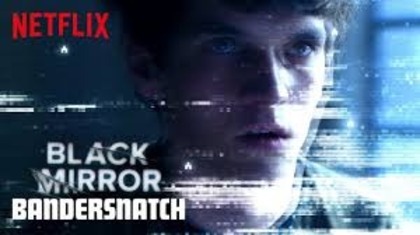 Alas, my enthusiasm wilted, when leaks indicated that Netflix’s story format would rely upon the “choose your own adventure” trope – basically a branched narrative. Many have tried and failed with this warhorse from our childhoods. When Bandersnatch’s first user choice was the protagonists’ breakfast cereal, I was positively morose. Here we go again, I thought. Nevertheless, I persisted, and I’m glad I did. Very quickly it was clear that choices were consequential to the plot, forcing choices between two unappealing options. Sometimes, it seemed, my choice wasn’t the “right” choice, and the app performed its own form of reboot—a bit like those “previously on,,,” montages that we’re used to seeing at the beginning of a new episode. Sometimes when this happened, I was presented with the same two options, sometimes the choices were different. I’ve read that the story had five different endings and very large number of plot permutations. I found my way to three of the five, each time learning something new about the way the system worked. Overall, I’d give this one three out of five stars.
Alas, my enthusiasm wilted, when leaks indicated that Netflix’s story format would rely upon the “choose your own adventure” trope – basically a branched narrative. Many have tried and failed with this warhorse from our childhoods. When Bandersnatch’s first user choice was the protagonists’ breakfast cereal, I was positively morose. Here we go again, I thought. Nevertheless, I persisted, and I’m glad I did. Very quickly it was clear that choices were consequential to the plot, forcing choices between two unappealing options. Sometimes, it seemed, my choice wasn’t the “right” choice, and the app performed its own form of reboot—a bit like those “previously on,,,” montages that we’re used to seeing at the beginning of a new episode. Sometimes when this happened, I was presented with the same two options, sometimes the choices were different. I’ve read that the story had five different endings and very large number of plot permutations. I found my way to three of the five, each time learning something new about the way the system worked. Overall, I’d give this one three out of five stars. Bandersnatch,
Bandersnatch,  Black Mirror,
Black Mirror,  Netflix in
Netflix in  2018,
2018,  Media,
Media,  design,
design,  games,
games,  innovation,
innovation,  movies,
movies,  storytelling,
storytelling,  technology,
technology,  television
television  Print Article
Print Article 